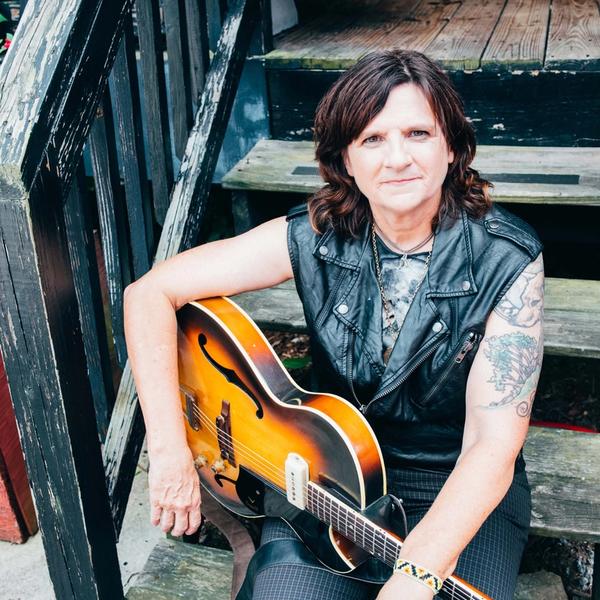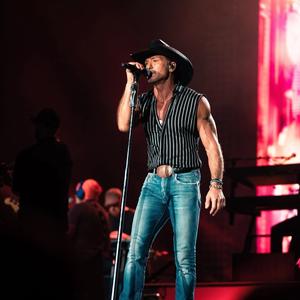




Link copied

Amy Ray and Emily Saliers burst onto the music scene as the Indigo Girls in 1989, suddenly grabbing everyone's attention with their ridiculously catchy, Grammy-winning song ‘Closer To Fine’.
Inhabiting the fertile zone between country, rock and folk music - long before Americana became an established genre - the duo became vocal role models for many gay and female artists in the scene, both back then and today. In the three decades since that breakthrough, they’ve continued to tour and make fine records, together and apart.
Ray is now onto her 10th solo album, If It All Goes South. This latest record was born during the pandemic months, when Ray had time to muse on everything truly important to her. It’s a testament to her influence that she was able to attract the highest calibre of guests to play and duet with her on it; bringing the likes of Brandi Carlile, Allison Russell, The Highwomen’s Natalie Hemby, Sarah Jarosz, I’m With Her and banjo whizz Alison Brown to join the party.
Being a gay, liberal, church-going Southerner is not without its challenges, with Ray admitting that she’s continuously “wrestling with demons”. Yet she always finds a powerful and often positive spin to drive her songs, whether they talk of community, inclusivity, social justice, the climate emergency or coping with loss.
Ray spoke to Holler from her cosy, small-town home in North Georgia; eagerly leaning into a conversation about everything, starting with Music City itself.
When did you first go to Nashville?
Well, the first time we recorded in Nashville was probably early ‘94-‘95. We were working with [British producer] Peter Collins at an awesome studio called Woodlands, which Gillian Welch owns now. I actually lived in Nashville for a year in 1983, when I was in college there, before I transferred back to another school in Atlanta.
What did you expect from it, and how did the reality differ?
My impression of Nashville at that time was that there was still a lot of struggle with racism and homophobia. It felt like the kind of good ol’ boy network, in some ways. But I was just learning how to write songs and I worked at a used record store, where I met a lot of really cool people who helped me. I met both the cream of the crop and great folks that you can find anywhere you look. So, my impression was there were a lot of struggles there, just the same as anywhere in the South.
The next time I went back, Emily and I played at the Bluebird Café, which would have been about ‘85-‘86. It’s very cool to play there; a great experience. I think we felt like babies in the world of Music City. We both liked country music, but felt on the outside because we’re gay, so we didn’t think of Nashville as a place where we could ever really belong.
Then we started recording there, met a lot of people and kept going back, even up to the present day. From the 90s, the city really opened up.
Did being a Southerner from Georgia help at all?
I think in our early days in Nashville, being gay trumped being from the South!
How has the industry as a whole changed – especially for women?
I think there’s still a ways to go, but it used to be that you couldn’t imagine making any headway in Nashville, as a performer or as a songwriter. Now, even in the country music and pop scenes, there are so many great outspoken women, it’s so cool.
Do you feel pride for opening the doors for female artists and having an influence on the likes of Allison Russell?
I don’t know about the influence I’ve had on them, but I do know of the influence they’ve had on me! Allison Russell is not only a good musician, singer and writer; she’s a great thinker, particularly on race, music and gender politics. She’s got a great spirit.
‘Subway’ is my favourite song on the album. What was it was like working on it with Brandi Carlile?
I’ve worked with Brandi for years; she’s sung on the majority of my solo records. I sent this off to her because it was a song I wrote as a tribute to a DJ called Rita Houston here in the States.
We both loved her, so I just sent it and said, “do whatever you want!” She sent me back a choir of Brandis; basically 10 vocal tracks. We transferred it to the tape we had of the song and it was amazing, it just popped right up and was brilliant. It’s one of the best vocals she’s ever done for me.
She’s a huge star and all that, but what people need to realise is that she is one of the best harmony singers ever. She can sing harmony to anything - she can find a part that no one else can and has this incredible instinct about them. It's rare.
Live, she doesn’t miss a note. She’s not a robot, but she is always in tune. Natalie Hemby is too; control and harmony is her wheelhouse. I was lucky to have those two on this record.
How did you find your muse in the difficulty of these last two years?
I guess it depends what kind of muse you’re trying to find. There is a different muse when you leave your house to go to another town – even when you’re driving around, you have different experiences. But, for me, a lot was going on during this time period because a lot was happening in the world.
Social justice movements were exploding with activity, there were marches everywhere and a lot was going on to think and write about. There’s also a lot to consider when you’ve been on the road your whole life and then suddenly, you’re stuck at home for 18 months. All of that entered the writing process.
Is it hard for you to balance your sexuality and your political stance with being religious?
It reminds me of that scene in The Crown, when the Queen is really into Billy Graham and they’re telling her she can’t be the Queen and also be into this fundamentalist Christian preacher, because the Church of England doesn’t work with this other thing. That’s kind of how I feel. Not with the Church of England, obviously, but with the church of the South.
Yes, I’m religious, but there are so many different forms of being religious and being Christian. I’m kind of a ‘Pagan Christian’, I was raised Christian and I went to church a lot, four or five days a week sometimes, for youth group and Bible school, choir and all the different activities. So that cosmos becomes your cosmos. It’s a social construct and you live your life that way, even if you don’t agree with the patriarchy, some of the language or even some of the rules.
I have my own relationship with all the ideas I grew up with, so I keep the good stuff and I wrestle with the bad. I try to throw the bad out, but it’s very hard when you’re raised a certain way. You’re all of a sudden wrestling with those demons and thinking, ‘this really got in me, this isn’t to be played with’.
These ideas were put into my head at a very young age, and now I have to untangle it all. But, I try not to lose the things I learned about giving back to your community, the gospel of Jesus as a historical figure and as a revolutionary at the time. The church has been the worst and the best; it’s often these people that show up to the peace events around social justice and there are often churches there that show up to support it. But the church creates bad things too.
Finally, what’s the last thing that made you laugh – apart from me, of course?
You are funny! This morning I was giggling because I have eight dogs; I have this new puppy and a year-old puppy. I just laughed because the new puppy had this bone on the dog bed and the older one was actually trying – instead of taking the bone from the puppy, because she’s so sweet – to flip the dog bed over with her head, just to get the puppy to move so she could grab the bone! It made me laugh; I wish I’d filmed it. It was definitely a TikTok video, no doubt about it!
~~
Amy Ray's 2022 album, If It All Goes South, is out now via Daemon Records.





